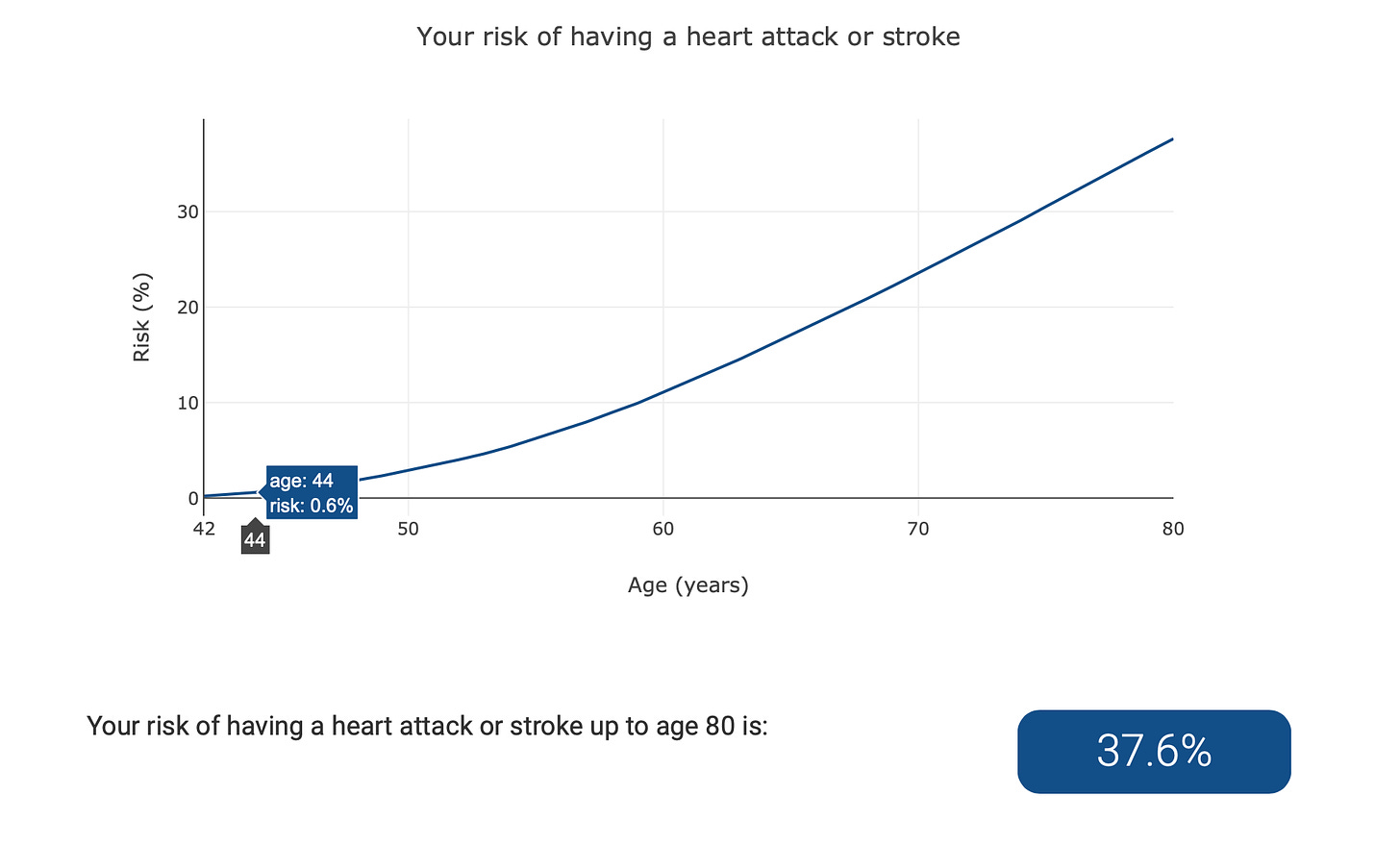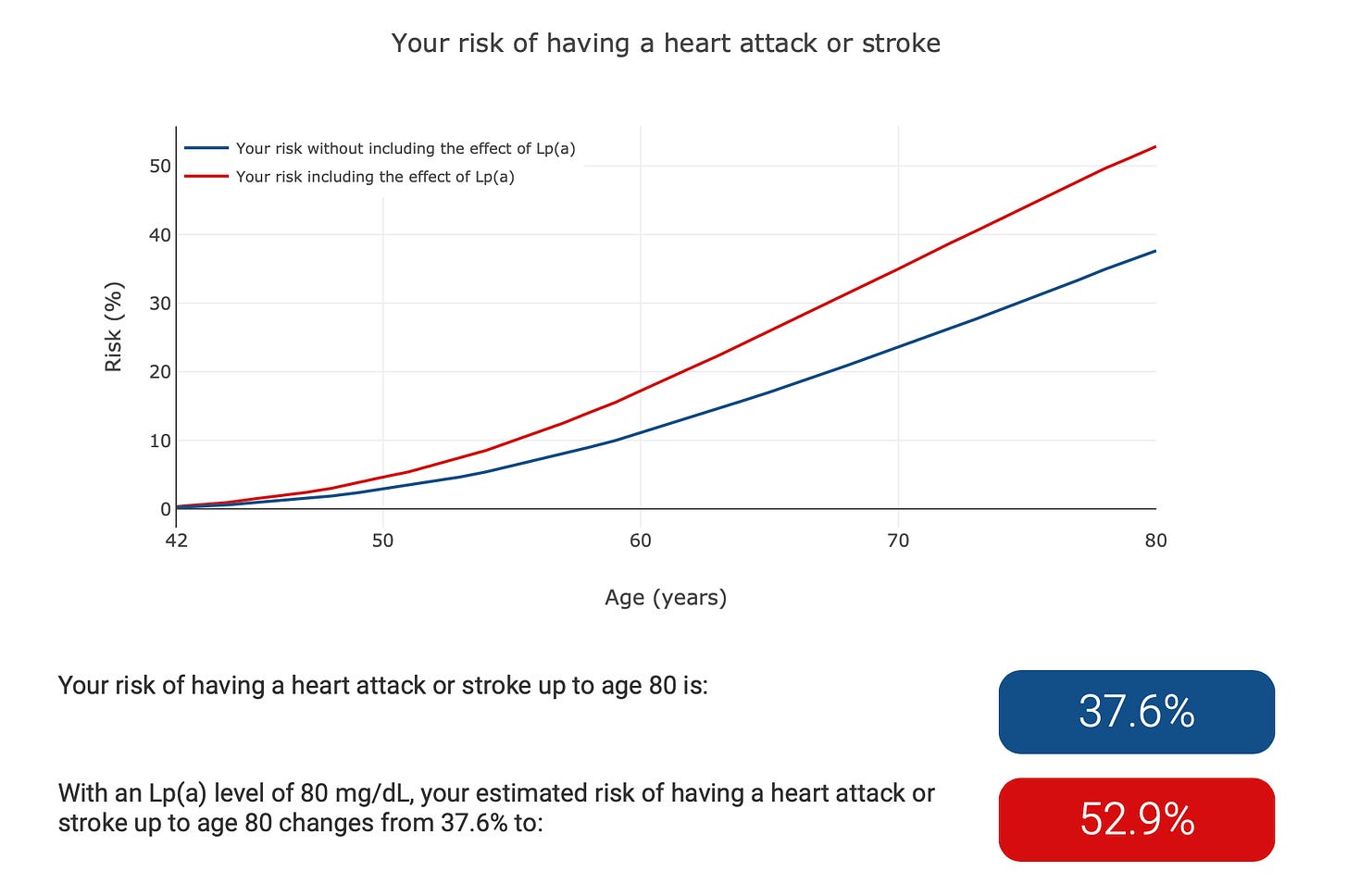How To Lower Your Risk Of Heart Attack If You Have An Elevated Lp(a)

If you have an early family of heart disease, you need to assess your Lp(a) levels.
Elevated Lp(a) is one of the most common genetic reasons people develop early heart disease.
It is super common. In some populations, 20 - 30% of people have elevated levels of Lp(a)1.
But here’s the problem.
Most people don’t know about it.
Most doctors, even cardiologists, don’t test for it.
There is at least a one in five chance I am taking about YOU.
There is a 100% chance I am talking about someone you know.
This is a big problem, and we are doing too little about it.
I have covered what Lp(a) is and why it is an independent risk factor for coronary artery disease in a previous post which you can find here.
The big issue with having an elevated Lp(a) is that no approved therapy is currently available to lower it - hence the not testing.
And most people think that because there is no currently approved therapy to lower it that there is no way to reduce your risk because of it.
I disagree.
Here’s how most people solve this problem:
They ignore it.
As Ayn Rand says:
“We can ignore reality, but we cannot ignore the consequences of ignoring reality.”
This is not a good strategy.
Here’s how the ‘Ignore It’ chain of logic goes.
“There is no approved therapy to lower Lp(a) levels, so why would I bother testing for it?”.
Spoken like someone with absolutely no skin in the game in this instance.
There is indeed no currently approved therapy to specifically lower Lp(a) levels and the risk associated with these elevated levels.
But that does not mean you cannot decrease a person’s risk.
Antisense oligonucleotide therapies can lower Lp(a) levels by 80-90%, but these are currently in phase 3 trials to assess if lowering Lp(a) levels to this degree will ultimately reduce future events.
Things look very promising, but we have to wait and see.
This trial will likely report in the coming years.
But before we even get to lowering risk in those with an elevated Lp(a), I have a major criticism of the ‘not testing’ approach.
Even if there wasn’t a way to lower risk, we must OFFER people the opportunity to KNOW what might be causing their genetic risk of heart disease.
Who are we as doctors to say whether or not you should have an explanation?
In my experience, a problem clearly identified loses much of its teeth from an anxiety perspective.
At least if there is something we can define as the problem, we will have some clarity and a goal to work towards.
Maybe, just maybe, people might want to know, if even just for the sake of knowing.
That might not be everyone’s desire, but it is for many patients I work with.
I can already hear the responses from the ‘non-testers’.
“OK. Sure. We can test it, but won’t it just cause more anxiety because there is nothing we can do to lower it?”
Not in my experience.
And also, and more importantly….
There are things you can do to lower your risk.
Here’s how.
Coronary artery disease is a multidimensional problem.
Elevated Lp(a) levels are an important component in increasing that risk.
But many other things drive up risk, particularly if also in the presence of an elevated Lp(a).
-
Smoking
-
Metabolic Syndrome
-
Inflammation
-
Inactivity
-
Diabetes
-
High Blood Pressure etc.
We already have very effective lifestyle and drug therapy approaches to these problems.
For my patients with an elevated Lp(a), it has often been the catalyst to start taking their lifestyle much more seriously, as they can now see the penalty of not doing so.
With this approach, we may not be lowering Lp(a), but we are reducing risk in total.
Sometimes seeing is believing.
We know that we cannot lower your CT Calcium Score (A marker of coronary artery disease), but we do know that if a patient is shown their CT scan images of the coronary calcification, they are more likely to engage in more positive health behaviours23.
This is EXACTLY the problem we are always trying to solve:
How to increase healthy lifestyle behaviours, and in my experience, it is an excellent way to do so.
Testing for Lp(a) is a similar approach.
But wait. There’s more.
To date, there have been no reliable ways of integrating an Lp(a) result into a lifetime risk calculator.
There is now.
CAUSAL AI is a predictive algorithm that calculates baseline risk in those with an elevated Lp(a) and what optimising both blood pressure and LDL cholesterol does to lifetime risk4.
Let’s take a 42-year-old male, who is a little overweight with a BMI of 26.1, has a systolic blood pressure of 135mmHg, an LDL cholesterol of 4 mmol/L (155 mg/dl) and a family history of heart attacks.
This is what their risk of a heart attack out to age 80 looks like.

As you can see, the near-term risk is very low, in the sub-1 % range.
However, the risk ratchets up fast.
By age 60: 11%
By age 70: 23%
By age 80: 37%
Now let’s see the same person’s risk if they have an elevated Lp(a).

The red line indicates the real risk with the elevated Lp(a).
See how things have changed.
By age 60: 11% is now 17%
By age 70: 23% is now 35%
By age 80: 37% is now 53%
Regardless of any opportunity to reduce risk, everyone deserves a more accurate estimation of their risk.
Not assessing Lp(a) levels means you are not getting an accurate estimation of your risk.
But what about lowering that risk?
Sure, knowing that you are at higher risk is useful, but it would be nice to see these figures go down.
They can.
Here’s how.
By doing the simple things right regarding blood pressure and cholesterol management.
Let’s look at the same person with the elevated Lp(a), but now let’s reduce their LDL cholesterol by 2 mmol/l (77mg/dl) and their systolic blood pressure by 15 mmHg.
Both are easy to do.
The pale blue line is where we land.

Once again, things are very different.
By age 60: 17% is now 7%
By age 70: 35% is now 12%
By age 80: 53% is now 15%
And this is WITHOUT lowering Lp(a)!
Sometimes we need that extra information to act as the trigger to make the lifestyle measures we know are necessary.
Sometimes being aware of an elevated Lp(a) can be the deal breaker in starting cholesterol-lowering or blood pressure-lowering medications earlier rather than later.
So yes.
There are no currently approved therapies to lower Lp(a).
But if anyone uses this as a justification for not testing for it, I would ask some serious questions.
Always remember YOU have the most to win and the most to lose when it comes to cardiovascular risk.
Only YOU get to decide what you think is high risk and what you think are acceptable reductions in risk with the therapies we have on offer.
But you have to be dealing with at least accurate information to make that decision.
Without knowing your Lp(a) levels, you are flying in the dark.
Check out the calculator here: Casual AI
Enas EA, Varkey B, Dharmarajan TS, Pare G, Bahl VK. Lipoprotein(a): An independent, genetic, and causal factor for cardiovascular disease and acute myocardial infarction. Indian Heart J. 2019 Mar-Apr;71(2):99-112.
Kalia NK, Miller LG, Nasir K, Blumenthal RS, Agrawal N, Budoff MJ. Visualizing coronary calcium is associated with improvements in adherence to statin therapy. Atherosclerosis. 2006 Apr;185(2):394-9.
Impact of coronary artery calcium scanning on coronary risk factors and downstream testing the EISNER (Early Identification of Subclinical Atherosclerosis by Noninvasive Imaging Research) prospective randomized trial. J Am Coll Cardiol. 2011 Apr 12;57(15):1622-32.
http://www.lpaclinicalguidance.com




